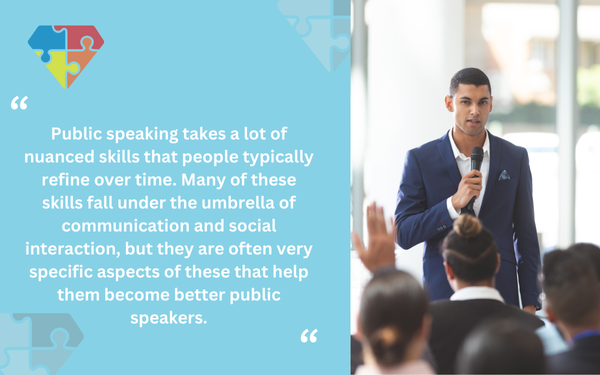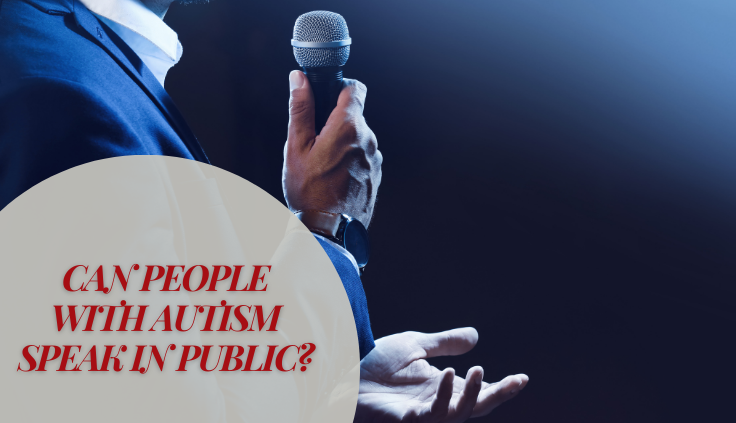Can People with Autism Speak in Public?
Children with autism spectrum disorder (ASD) face many common struggles that can affect them in their daily lives. While there are different degrees to which their symptoms may affect them, two of the most common things they typically struggle with are social interactions and communication.
These deficits can often affect different aspects of life that don’t affect their neurotypical peers. Again, each individual with autism can be affected differently, so approaching support services really needs to be done on a case-by-case basis.
This is a major reason why applied behavior analysis, or ABA therapy, is considered the gold standard treatment options for people with ASD — since it’s a highly personalized and customized plan.
Public speaking is something that many people struggle with, regardless of their developmental abilities. People with ASD, though, may face even bigger challenges with such a task, since it involves both communication and social interaction skills.
That being said, people with autism certainly can speak in public, though they may need support services to master those skills. Here are some ways that people with autism can improve their public speaking skills.
Table Of Contents
What are Some of the Challenges That People with ASD Face with Public Speaking?
Public speaking takes a lot of nuanced skills that people typically refine over time. Many of these skills fall under the umbrella of communication and social interaction, but they are often very specific aspects of these that help them become better public speakers.

One is the ability to interpret and understand nonverbal cues. People who are good public speakers often have an innate ability to notice the facial expressions and body language of other people, and then adjust their speaking to how the audience is reacting.
Another is remaining calm and comfortable. For people who are prone to social anxiety, this can be difficult. It’s very important, for instance, for one to not worry about making mistakes or whether people are judging you if you want to be a good public speaker.
Finally, you have to be able to organize your thoughts well, many times on the fly. This will ensure that you stay on task and that you communicate your points well.
All of these things can be a struggle for people with ASD, which can make it more challenging for them to master the art of public speaking.
| Challenges with Public Speaking | Strategies for Improvement |
|---|---|
| Difficulty interpreting nonverbal cues | Practice with trusted individuals, film yourself for review |
| Social anxiety and fear of judgment | Prepare and read from a written speech, rehearse beforehand |
| Trouble organizing thoughts quickly | Structure your speech as a relatable story to stay focused |
How Can People with Autism Improve Their Public Speaking?
While these are common challenges that people with autism may face in public speaking, there are many strategies they can follow to improve their skills and make them feel more comfortable.
One effective strategy is to plan in advance what you will say. Instead of flying by the seat of your pants, like some people do when they speak in public, it may be best to prepare a speech that you can read from.

It may be easier for people with ASD to write their thoughts down in a coherent way on their own, and then simply read from that text in front of other people.
Not only will this remove some anxiety, it also gives you the opportunity to practice the speech at home before you give it. You can have others in the room who you trust and are comfortable with — such as parents, friends or other family members — as your “test audience.”
It might also be a good idea to film yourself giving the speech so that you can review the tape and see what you liked and what you want to adjust.
Another strategy that could help would be to make your speech a story. Not only might it be easier for you to recount a story and tell it to other people, but stories are something that audiences often can easily relate to.
In other words, by telling a story rather than focusing on giving a speech, you may be gaining more confidence as a public speaker while also improving the effectiveness of what you say.
| Step | What It Helps With | Why It Works for ASD |
|---|---|---|
| Prepare a written speech | Reduces anxiety | Allows clarity and structure |
| Practice in front of family | Builds confidence | Familiar environment lowers stress |
| Watch your own recordings | Spot areas for improvement | Self-guided, low-pressure feedback |
| Tell a story | Boosts engagement | Natural and relatable format |
Blue Gems ABA Helps Children with ASD Improve Key Skills
People with autism may face additional struggles with public speaking that their neurotypical peers don’t, but they certainly can learn to improve these abilities. Through ABA therapy, for instance, patients can improve their communication and social interaction skills from a young age.
At Blue Gems ABA, we are dedicated to helping support children with autism improve key skills such as communication and social interaction. We also help them modify certain negative and/or harmful behaviors, so they can live happy, healthy, productive, fulfilling and independent lives.
To learn more, please contact us today.




